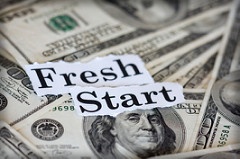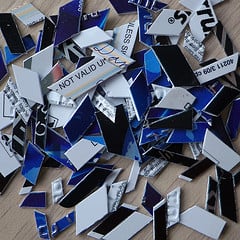Debt Settlement is a great way to pay off old, delinquent debts. But, will it hurt or help your credit score?
 If you find yourself with too much debt and not enough money to keep up with at least the minimum payments, a debt settlement program may just be what you need to get a fresh start!
If you find yourself with too much debt and not enough money to keep up with at least the minimum payments, a debt settlement program may just be what you need to get a fresh start!
But, I'm always asked, "Will debt settlement lower or raise my credit score?
Let's be honest....
The reason you are considering debt settlement is most likely due to the fact that you have accumulated so too much debt and your credit score had gone down already!
Maybe you...
- Lost your job.
- Are retired and living on tight, fixed income from Social Security and/or other retirement income.
- Had a serious illness or possibly a career ending disability.
- Went through a divorce.
- The death of a spouse or partner.
How are Credit Scores determined?
There are basically 5 things that go into making up your credit score:
Payment history ...
- This makes up about 35% of your credit score!
- How have you been handling credit?
- Do you make payments on time?
- Have you been late too often?
- How long have you been using credit?
Balance-to-limit ratio...
This accounts for 30% of your credit score and in my opinion, actually carries more weight!
Add up all of your balances and the total credit limits you have.
Divide the total balance by the total limit.
Example:
You have about $25,000 of total credit card balances on 5 different cards.
Your total credit limit (each card is different) adds up to $35,000.
$25,000 divided by $35,000 = 71% !!!
When your ratio is above 30%, lenders think that you are over-extended and are not a very good risk to pay back a loan, etc.
This balance/limit ration is very, very important!
*Hint:
Many people make a serious mistake in trying to improve their credit scores by closing credit accounts or cards after paying them off.
Let's continue the example above and see what really happens:
Before: $25,000 of $35,000 of available credit (credit limits) or 71% (too high!)
After paying off a couple of cards, the ration looks like this:
Total account balance $ 10,000
Total credit limit $ 35,000
Ratio: $10,000 divided by $35,000 = 28% !!! (Looking good!)
Thinking that getting rid of a couple of cards will help his credit score, he calls and closes 2 accounts and his credit score goes back down!
Ratio: $10,000 divided by only $25,000 (closed 2 accounts with $10,000 limit)
Now his ration is back up to 40%. Yes, better than 71% before, but still over the 30% goal!
Length of Credit History...
This accounts for about 15% of your credit score.
Younger borrowers have not established a "credit use history" and fair or not, are punished in their credit score.
Lenders are looking for seasoned credit users who have proven they can handle credit.
It will take some time for this factor (only 15% weight) to improve.
In the meantime, don't run out and start opening up several credit cards thinking this will help!
This takes us to the next factor:
New Credit...
If you try opening several credit or store cards, it suggests to the lenders and the credit bureaus that you may be in financial trouble and are trying to "borrow your way out"!
Even though new credit accounts for only 10% of your credit score, it is still very important!
There are no "short cuts". It takes time and a good payment history to improve your credit score.
Credit mix...
A good mix of revolving credit (credit cards) and installment loans (auto loan) looks better and is viewed as a good risk to lenders and the credit bureaus!
Although accounting for 10% of your score, this is still important!
OK, now you see there are several factors that go into making up your credit score. So will a debt settlement program help or hurt your credit score?
If the only way to start improving your credit score is by paying down the balances, what if you just don't have that much income?
If your total minimum payments requires $500/month and you only have about $200 (if there are no emergencies, etc.), what are your options?
Debt Management (used to be called "credit counseling")
In this program, each of your creditors agrees to lower your interest and possibly waive some late or over-the-limit fees.
Your total monthly payment is usually about 2.4% of the total balances, which may be the same or even higher than the total of all of your payments now!
Let's say you have $25,000 of total credit.
At 2.4%, that's a payment of abut $600 a month!
If you are having trouble making the required total monthly minimum payments now, most likely a Debt Management Program will not help.
Debt Settlement
Once your accounts start going to collections and you start getting letters and calls (lots of calls!), it's time to face the hard facts!
You're in real trouble and if you don't do something quickly, creditors may start to file claims which leads to a summons, which can lead to judgments.
After a judgment is awarded, a creditor can apply for wage garnishment and/or a bank levy!
Serious stuff!
When a borrower is in serious trouble, they may be thinking about looking into BANKRUPTCY as their only solution.
Creditors will usually be willing to accept a settlement or reduced amount to avoid this.
Settlements can run from 40% to 70%, depending on several factors.
The bottom line is that once a settlement is completed, even though your credit history shows late or no payments for awhile, now you have repaid or "settled-as-agree" the account and you have a $0 balance!
To potential lenders and the credit bureaus, this looks good and your credit scores will start to improve!
Bottom line...
Debt Settlement will help improve your credit score over time!









